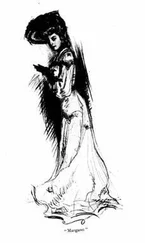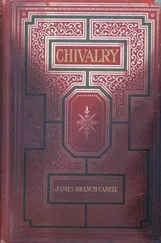James Cabell - The Rivet in Grandfather's Neck. A Comedy of Limitations
Здесь есть возможность читать онлайн «James Cabell - The Rivet in Grandfather's Neck. A Comedy of Limitations» весь текст электронной книги совершенно бесплатно (целиком полную версию без сокращений). В некоторых случаях можно слушать аудио, скачать через торрент в формате fb2 и присутствует краткое содержание. Жанр: Фэнтези, на английском языке. Описание произведения, (предисловие) а так же отзывы посетителей доступны на портале библиотеки ЛибКат.
- Название:The Rivet in Grandfather's Neck. A Comedy of Limitations
- Автор:
- Жанр:
- Год:неизвестен
- ISBN:нет данных
- Рейтинг книги:3 / 5. Голосов: 1
-
Избранное:Добавить в избранное
- Отзывы:
-
Ваша оценка:
- 60
- 1
- 2
- 3
- 4
- 5
The Rivet in Grandfather's Neck. A Comedy of Limitations: краткое содержание, описание и аннотация
Предлагаем к чтению аннотацию, описание, краткое содержание или предисловие (зависит от того, что написал сам автор книги «The Rivet in Grandfather's Neck. A Comedy of Limitations»). Если вы не нашли необходимую информацию о книге — напишите в комментариях, мы постараемся отыскать её.
The Rivet in Grandfather's Neck. A Comedy of Limitations — читать онлайн бесплатно полную книгу (весь текст) целиком
Ниже представлен текст книги, разбитый по страницам. Система сохранения места последней прочитанной страницы, позволяет с удобством читать онлайн бесплатно книгу «The Rivet in Grandfather's Neck. A Comedy of Limitations», без необходимости каждый раз заново искать на чём Вы остановились. Поставьте закладку, и сможете в любой момент перейти на страницу, на которой закончили чтение.
Интервал:
Закладка:
She cried a little, though. "It—it's because I remember him when he was turning out his first mustache," she explained, lucidly.
But with the horror and irony of John Charteris's assassination the biographer of Rudolph Musgrave has really nothing to do save in so far as this event influenced the life of Rudolph Musgrave.
It was on the day of Charteris's death—a fine, clear afternoon in late September—that Rudolph Musgrave went bass-fishing with some eight of his masculine guests. Luncheon was brought to them in a boat about two o'clock, along with the day's mail.
"I say—! But listen, everybody!" cried Alfred Chayter, whose mail included a morning paper—the Lichfield Courier-Herald , in fact.
He read aloud.
"I wish I could be with Anne," thought Colonel Musgrave. "It may be I could make things easier."
But Anne was in Lichfield now….
He had just finished dressing for supper when it occurred to him that since their return from the river he had not seen Patricia. He was afraid that Patricia, also, would be upset by this deplorable news.
As he crossed the hall Virginia came out of Patricia's rooms. The colonel raised his voice in speaking to her, for with age Virginia was growing very deaf.
"Yaas, suh," she said, "I'm doin' middlin' well, suh, thank yeh, suh. Jus' took the evenin' mail to Miss Patricy, like I always do, suh." She went away quietly, her pleasant yellow face as imperturbable as an idol's.
He went into Patricia's bedroom. Patricia had been taking an afternoon nap, and had not risen from the couch, where she lay with three or four unopened letters upon her breast. Two she had opened and dropped upon the floor. She seemed not to hear him when he spoke her name, and yet she was not asleep, because her eyes were partly unclosed.
There was no purple glint in them, as once there had been always. Her countenance, indeed, showed everywhere less brightly tinted than normally it should be. Her heavy copper-colored hair, alone undimmed, seemed, like some parasitic growth (he thought), to sustain its beauty by virtue of having drained Patricia's body of color and vitality.
There was a newspaper in her right hand, with flamboyant headlines, because to Lichfield the death of John Charteris was an event of importance.
Patricia seemed very young. You saw that she had suffered. You knew it was not fair to hurt a child like that.
But, indeed, Rudolph Musgrave hardly realized as yet that Patricia was dead. For Colonel Musgrave was thinking of that time when this same Patricia had first come to him, fire-new from the heart of an ancient sunset, and he had noted, for the first time, that her hair was like the reflection of a sunset in rippling waters, and that her mouth was an inconsiderable trifle, a scrap of sanguine curves, and that her eyes were purple glimpses of infinity.
"This same Patricia!" he said, aloud.
PART NINE - RELICS
"You have chosen the love 'that lives sans murmurings,
Sans passion,' and incuriously endures
The gradual lapse of time. You have chosen as yours
A level life of little happenings;
And through the long autumnal evenings
Lord Love, no doubt, is of the company,
And hugs your ingleside contentedly,
Smiles at old griefs, and rustles needless wings.
"And yet I think that sometimes memories
Of divers trysts, of blood that urged like wine
On moonlit nights, and of that first long kiss
Whereby your lips were first made one with mine,
Awake and trouble you, and loving is
Once more important and perhaps divine."
I
To those who knew John Charteris only through the medium of the printed page it must have appeared that the novelist was stayed in mid-career by an accident of unrelieved and singular brutality. And truly, thus extinguished by the unfounded jealousy of a madman, the force of Charteris's genius seemed, and seems to-day, as emphasized by that sinister caprice of chance which annihilated it.
But people in Lichfield, after the manner of each prophet's countrymen, had their own point of view. The artist always stood between these people and the artist's handiwork, in part obscuring it.
In any event, it was generally agreed in Lichfield that Anne Charteris's conduct after her husband's death was not all which could be desired. To begin with, she attended the funeral, in black, it was true, but wearing only the lightest of net veils pinned under her chin—"more as if she were going somewhere on the train, you know, than as if she were in genuine bereavement."
"Jack didn't approve of mourning. He said it was a heathen survival."
That was the only explanation she offered.
It seemed inadequate to Lichfield. It was preferable, as good taste went, for a widow to be too overcome to attend her husband's funeral at all. And Mrs. Charteris had not wept once during the church ceremony, and had not even had hysterics during the interment at Cedarwood; and she had capped a scandalous morning's work by remaining with the undertaker and the bricklayers to supervise the closing of John Charteris's grave.
"Why, but of course. It is the last thing I will ever be allowed to do for him," she had said, in innocent surprise. "Why shouldn't I?"
Her air was such that you were both to talk to her about appearances.
"Because she isn't a bit like a widow," as Mrs. Ashmeade pointed out. "Anybody can condole with a widow, and devote two outer sheets to explaining that you realize nothing you can say will be of any comfort to her, and begin at the top of the inside page by telling her how much better off he is to-day—which I have always thought a double-edged assertion when advanced to a man's widow. But you cannot condole with a lantern whose light has been blown out. That is what Anne is."
Mrs. Ashmeade meditated and appeared dissatisfied. "And John Charteris of all people!"
Anne was presently about the Memorial Edition of her husband's collected writings. It was magnificently printed and when marketed achieved a flattering success. Robert Etheridge Townsend was commissioned to write the authorized Life of John Charteris and to arrange the two volumes of Letters .
Anne was considered an authority on literature and art in general, through virtue of reflected glory. And in the interviews she granted various journalists it was noticeable that she no longer referred to "Jack" or to "Mr. Charteris," but to "my husband." To have been his wife was her one claim on estimation. And, for the rest, it is inadequate to love the memory of a martyr. Worship is demanded; and so the wife became the priestess.
II
Into Colonel Musgrave's mental processes during this period it will not do to pry too closely. The man had his white nights and his battles, in part with real grief and regret, and in part with sundry emotions which he took on faith as the emotions he ought to have, and, therefore, manifestly, suffered under…. "Patricia was my wife, Jack was my brother," ran his verdict in the outcome; and beyond that he did not care to go.
For death cowed his thoughts. In the colonel's explicit theology dead people were straightway conveyed to either one or the other of two places. He had very certainly never known anybody who in his opinion merited the torments of his orthodox Gehenna; so that in imagination he vaguely populated its blazing corridors with Nero and Judas and Caesar Borgia and Henry VIII, and Spanish Inquisitors and the aboriginal American Indians—excepting of course his ancestress Pocahontas—and with Benedict Arnold and all the "carpet-baggers" and suchlike other eminent practitioners of depravity. For no one whom Rudolph Musgrave had ever encountered in the flesh had been really and profoundly wicked, Rudolph Musgrave considered; and so, he always gravely estimated this-or-that acquaintance, after death, to be "better off, poor fellow"—as the colonel phrased it, with a tinge of self-contradiction—even if he actually refrained in fancy from endowing the deceased with aureate harps and crowns and footgear. In fine, death cowed the colonel's thoughts; beyond the grave they did not care to venture, and when confronted with that abyss they decorously balked.
Читать дальшеИнтервал:
Закладка:
Похожие книги на «The Rivet in Grandfather's Neck. A Comedy of Limitations»
Представляем Вашему вниманию похожие книги на «The Rivet in Grandfather's Neck. A Comedy of Limitations» списком для выбора. Мы отобрали схожую по названию и смыслу литературу в надежде предоставить читателям больше вариантов отыскать новые, интересные, ещё непрочитанные произведения.
Обсуждение, отзывы о книге «The Rivet in Grandfather's Neck. A Comedy of Limitations» и просто собственные мнения читателей. Оставьте ваши комментарии, напишите, что Вы думаете о произведении, его смысле или главных героях. Укажите что конкретно понравилось, а что нет, и почему Вы так считаете.



